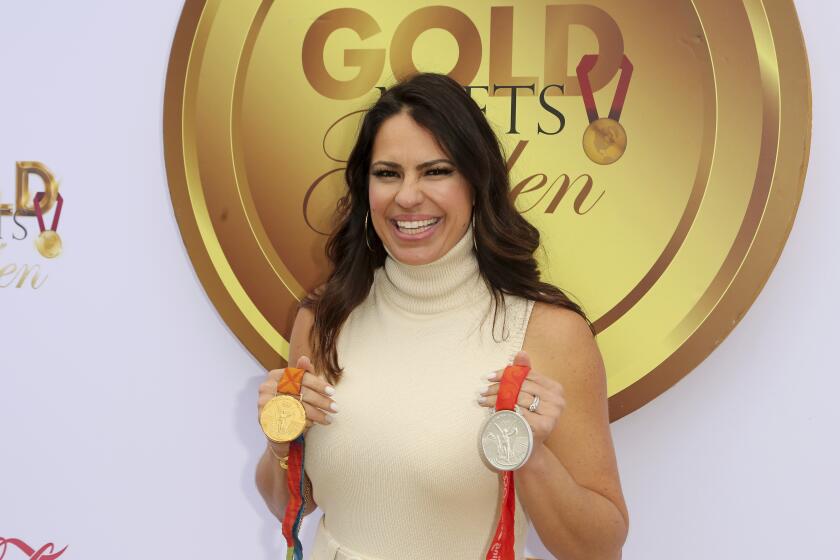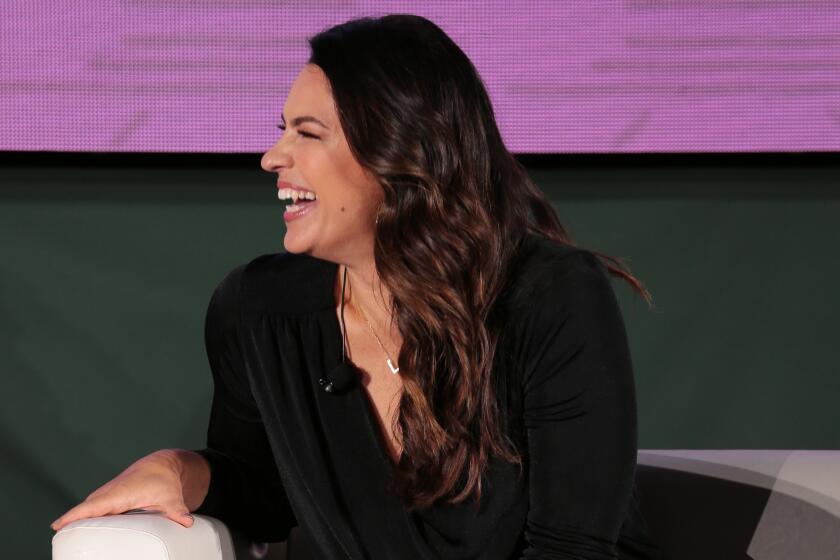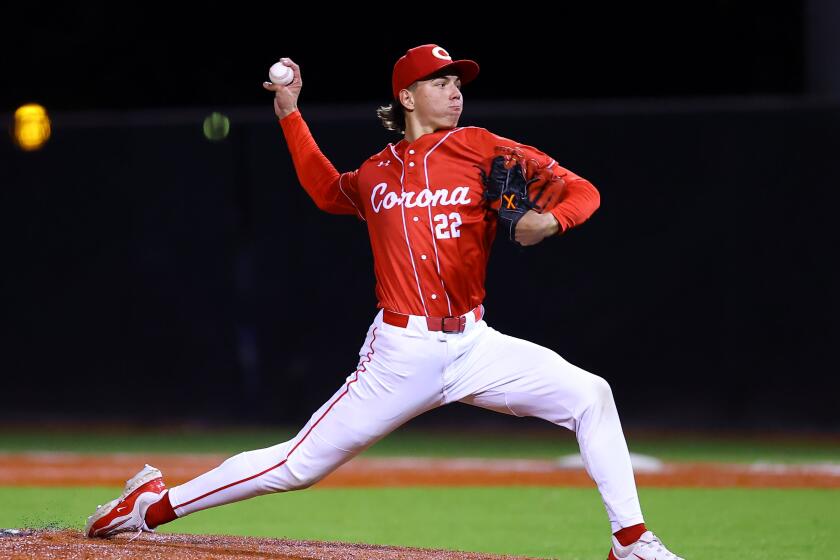Column: The voice of the Dodgers and Angels? Make that the voices
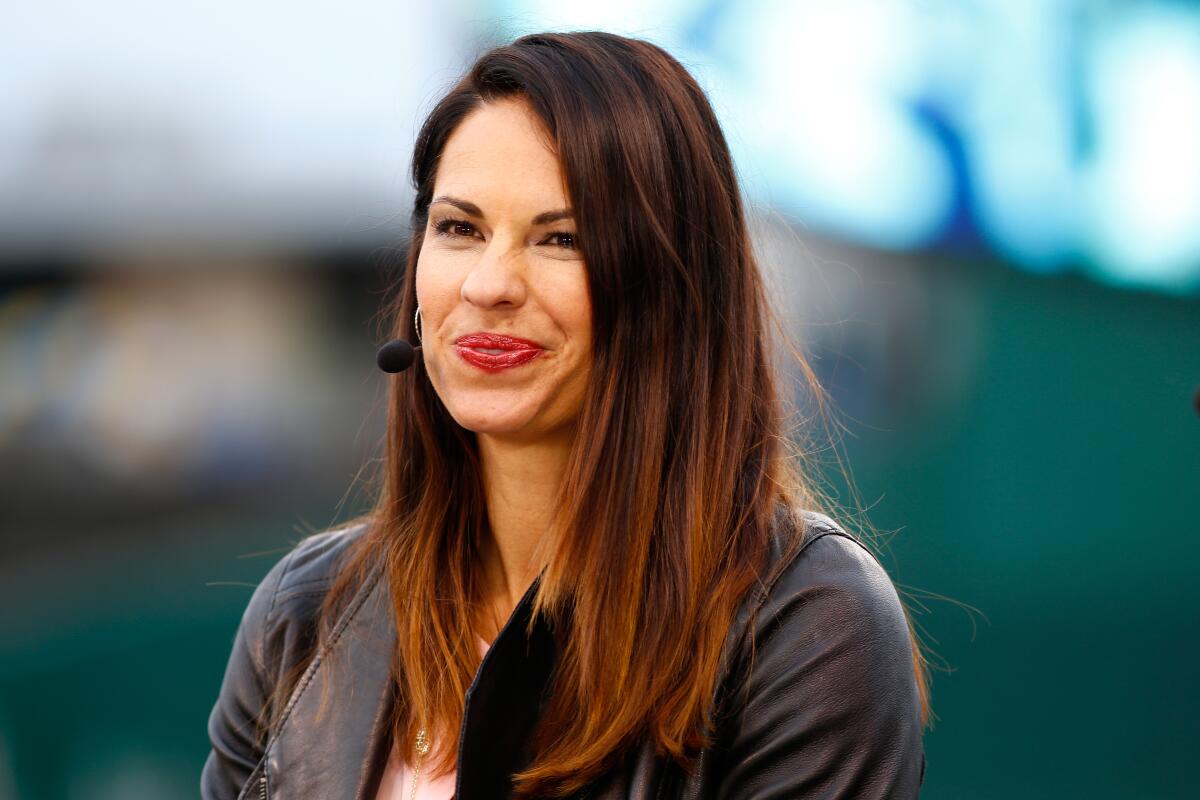
- Share via
Their voices were distinctive, their words weaving the soundtrack of our cherished sports memories.
Vin Scully was a comforting constant through 67 years of Dodgers broadcasts, a unique link from Jackie Robinson and the Brooklyn Bums to the era of wild-card playoff teams and Twitter tantrums. Bob Miller exulted and agonized — mostly agonized — for 44 seasons with the Kings. Chick Hearn didn’t just do play-by-play on Lakers games — he was a part of the show, creating a language for basketball while putting Lakers victories in the refrigerator with the eggs cooling, the butter getting hard and the Jell-O jiggling.
“When I first started working for the Lakers back in the ‘80s we had one broadcaster: Chick Hearn. He did the radio, he did the TV,” said Lon Rosen, now the Dodgers’ executive vice president and chief marketing officer. “The broadcast world has changed and evolved quite a bit over the last couple of years.”
Watching or listening to the Dodgers and Angels this season has become a guessing game. Sometimes, you can’t tell the announcers without a scorecard or be sure who will do play by play or analysis from one day to the next.
The tradition of one announcer or a few voices being synonymous with a team is going, going, gone, perhaps to be ushered out when splendid Hall of Famer Jaime Jarrín retires from the Dodgers’ Spanish-language broadcasts after this season, his 64th. Change is normal, even if it’s difficult to let go of announcers whose voices transport us back to good times and thoughts of long-gone friends and family.
Former Olympic softball player and ESPN broadcaster Jessica Mendoza joins a reconfigured Dodgers TV and radio coverage team for the 2022 season.
More recently, the COVID-19 pandemic has brought massive changes to broadcast plans, sometimes on short notice. For example, Daron Sutton, fired as the Angels’ backup TV voice last July without public explanation, popped up as the play-by-play announcer on several Dodgers telecasts last month when Joe Davis was working for Fox and the virus was running through the broadcast crew.
But if the revolving door leading to the broadcast booths can cause confusion it also allows for discovering new stories and insights, of hearing Dontrelle Willis’ humor, Jessica Mendoza’s diligent reporting, Eric Karros’ deep knowledge, and José Mota’s bilingual expertise as a host or analyst.
“It’s unique, there is no question about that,” said Rick Monday, whose golden tones are familiar as the Dodgers’ radio analyst alongside Charley Steiner the past 18 years and occasionally on play by play. “We have to check the schedule to see exactly. ‘Oh, I’m working with you today? OK, fine. Let’s do it.’”
He was only half joking.
There have been questions about TV analyst Orel Hershiser’s vaccination status, but he has not publicly commented on the issue. When asked about Hershiser’s absence from select games, the Dodgers responded they hired five radio and TV analysts this season, making the decision, they said, while Hershiser was leaning toward traveling less so he could focus on business ventures.
They added Karros, Mendoza and Willis as TV analysts, Adrian Gonzalez for pre- and postgame commentary, and Mota for English and Spanish radio and English TV broadcasts.
With Davis’ duties as the lead play-by-play announcer for Fox leading him to trim his Dodgers workload to 115-120 games per season and Steiner reducing his travel, Tim Neverett gets a lot of practice in adjusting to various partners’ habits. He has done it before as one of two play-by-play announcers in Pittsburgh who teamed with a rotation of three analysts.
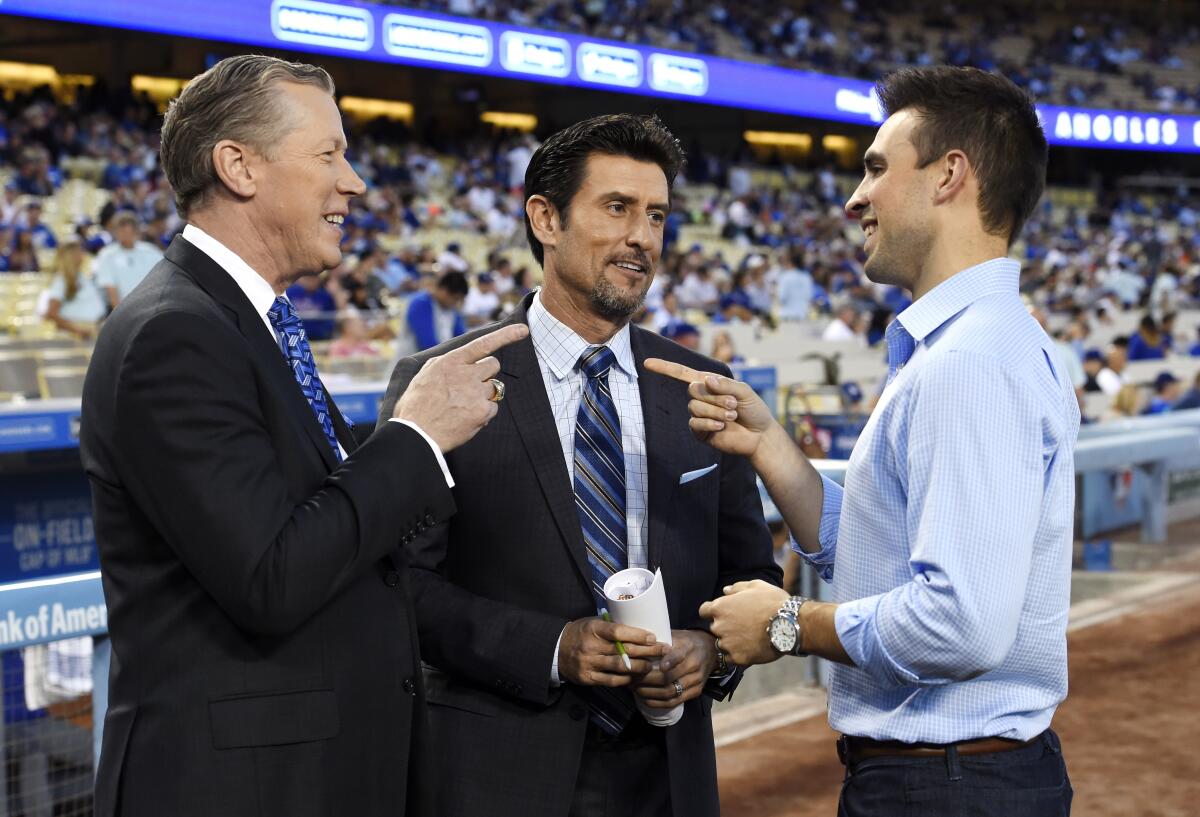
“For me to go from working with Orel on TV one night and Rick Monday on radio another night or Eric Karros on TV — I’ll be with him [this] weekend in San Francisco — I think it’s different because sometimes the way you would try to draw from them would be different. Each voice is different,” said Neverett, who grew up in Nashua, N.H., listening to gravel-voiced Johnny Most on Celtics games, Joe Castiglione and Ken Coleman on Red Sox radio and Dick Stockton and Hawk Harrelson on Red Sox TV.
“The analysts are extremely valuable resources,” Neverett said. “When it comes to TV, it’s really, I think, more of an analysts’ medium. Radio, the opposite. But we’ve got such a great radio analyst here in Rick. I love having conversations with him during games and getting him to talk about all kinds of baseball stuff.”
The Dodgers’ radio side has been more predictable, though Steiner was sidelined by COVID for two weeks. He said he and Monday will call every game down the stretch and during postseason play. “I can’t tell you how lucky I am, and I feel that we are a constant. It’s been a pretty good marriage,” Steiner said.
Mota carries to each assignment advice imparted by Tommy Hawkins, an original L.A. Laker who later became a Dodgers executive: the credential Mota wears is his entry into the players’ world, and it’s his job to bring that world to fans.
“There’s a lot of variety and a lot of information, which is the main thing — to keep the fan informed on every aspect of what we cover. Whatever we do best, offer it to the fans,” said Mota, who’s the son of former Dodger Manny Mota and ran around the clubhouse as a kid. “Growing up, your announcer was your information. Where did it come from? One guy. Now, there’s so many things.”
The Angels’ TV situation also has been changeable, but less happily.
Fox Sports West (now Bally Sports West) hired nationally known Matt Vasgersian before the 2021 season to replace Victor Rojas, who left to become president of a minor league team. Sutton was to be the backup when Vasgersian worked for ESPN or the MLB Network. The pandemic wreaked havoc with that plan, as with so much else, keeping Vasgersian remote and limiting his appearances. Sutton became the primary voice with Mota and Mark Gubicza but Sutton was fired at midseason, leaving Rich Waltz to finish out the schedule.
Paired with Joe Davis, Jessica Mendoza is both entertaining and informative while working select road games on the Dodgers TV broadcasts.
Vasgersian hasn’t been in the booth as often as expected this season, though he called games during the Angels’ recent East Coast trip. Patrick O’Neal, who’s pleasant as a pre- and postgame host but lacks the timing and instincts for play by play, has called most of the games. A spokeswoman for Bally Sports West twice declined to comment on plans for the Angels’ TV plans.
In the meantime, the Dodgers’ revolving door will continue to whirl. Rosen said fans have reacted positively to the multi-announcer cast and he’s happy with the mix. And there are benefits to different viewpoints and voices.
“We’re fortunate,” Monday said. “Everyone sees it differently through their eyes, so when you’re working with someone that you’re not working with all the time, it brings in another element. And sometimes it’s a very fresh element. Sometimes you say, ‘I haven’t really thought about that,’ and maybe you take it in different avenues. It’s like having a conversation, but we’re trying to have a conversation in and around a baseball game.”
And we get to listen.
More to Read
Go beyond the scoreboard
Get the latest on L.A.'s teams in the daily Sports Report newsletter.
You may occasionally receive promotional content from the Los Angeles Times.

